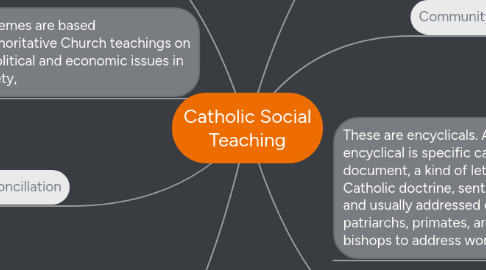
1. Dignity in Work
1.1. Rerum Novarum
1.1.1. The condition of the workers is the question of the hour. It will be answered one way or another, rationally or irrationally, and which way it goes is of the greatest importance to the state.
1.2. Laborem Exercens
1.2.1. Only man is capable of work, and only man works, at the same time by work occupying his existence on earth. Thus work bears a particular mark of man and of humanity, the mark of a person operating within a community of persons. And this mark decides its interior characteristics; in a sense it constitutes its very nature.
2. Peace and Reconcillation
2.1. Pacem In Terris
2.1.1. Peace on earth, which all men of every era have most eagerly yearned for, can be firmly established only if the order laid down by God be dutifully observed.
2.2. Reconciliatio et Paenitentia
2.2.1. To speak of reconciliation and penance is for the men and women of our time an invitation to rediscover, translated into their own way of speaking, the very words with which our savior and teacher Jesus Christ began his preaching: "Repent, and believe in the Gospel, that is to say, accept the good news of love, of adoption as children of God and hence of brotherhood
3. Solidarity
3.1. Sollicitudo Rei Socialis
3.1.1. We are all one family in the world. Building a community that empowers everyone to attain their full potential through each of us respecting each other's dignity, rights and responsibilities makes the world a better place to live.
3.2. Caritas In Veritate
3.2.1. Openness to life is at the centre of true development. When a society moves towards the denial or suppression of life, it ends up no longer finding the necessary motivation and energy to strive for man's true good. If personal and social sensitivity towards the acceptance of a new life is lost, then other forms of acceptance that are valuable for society also wither away.
4. These themes are based from authoritative Church teachings on social, political and economic issues in our society,
5. Human Dignity
5.1. Evangelium Vitae
5.1.1. Man is called to a fullness of life which far exceeds the dimensions of his earthly existence, because it consists in sharing the very life of God.
5.2. Pacem Terris
5.2.1. Man has the right to live. He has the right to bodily integrity and to the means necessary for the proper development of life, particularly food, clothing, shelter, medical care, rest, and, finally, the necessary social services.
6. Community and Participation
6.1. Evangelli Gaudium
6.1.1. Whenever our interior life becomes caught up in its own interests and concerns, there is no longer room for others, no place for the poor. God’s voice is no longer heard, the quiet joy of his love is no longer felt, and the desire to do good fades.
6.2. Quadragesimo Anno
6.2.1. It is impossible to promote the dignity of the person without showing concern for the family, groups, associations, local territorial realities.
7. Care for Creation
7.1. Laudato Si'
7.1.1. Although change is part of the working of complex systems, the speed with which human activity has developed contrasts with the naturally slow pace of biological evolution.
7.2. Mater et Magistra
7.2.1. Nothing is said in the second of these commandments about destroying nature. On the contrary, it must be brought into the service of human life.

